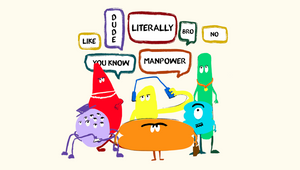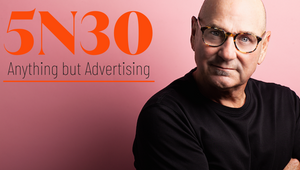
Trust, Tech, and Transformation: A Meta-Analysis of Trends for 2019

There’s momentum in every corner of our culture right now. Social, political, technological. In art, in sports. In business and academia. To find that momentum, to hitch a ride on it - to advance it, even - we must subject ourselves to a process of distinguishing signal from noise. The three trends we share here - New Ownership, Data is Money, and Know Thyself - are a piece of that process. Lenses through which we view and make sense of the world, as we go about our work and our lives in 2019.
TREND #1: New Ownership
“Good is the new cool” evolves in 2019, through accountability and visibility.
Shared values. Actvertising. Afdhel Aziz and Bobby Jones’ thesis on the new model of marketing has been out and being built upon since 2016, and the central thought around even before that. What happens now? As political and social pressure continues to mount, with no legislative release in sight, we’re experiencing a new record high in disparity in trust, as uncovered by this year’s Edelman Trust Barometer.
In 2019, we enter a new age of ownership. Where people internalise that the onus for progress is on them, and take up that mantle using their own tools. To decide who who gets to be famous and who gets to be elected (arguably too synonymous), and what gets bought and used.
Let’s unpack this a bit. As 2020 hopefuls clamour to crack the AOC model for themselves, our standards for transparency and engagement will advance, rapidly. This tightening feedback loop is empowering. And so from the ashes of failed discourse, a phoenix rises - the political meme, reinvented. While meme culture notably took a subversive turn in 2016 after the lightheartedness of O & Joe, memes are emerging as a legitimate vehicle of discourse. This reclaiming of discourse amplifies as mainstream media outlets (partisan and not) fail to get off the drug of horse race media coverage.
Importantly, this will transcend the (sorry if this phrase is triggering) echo chambers of coastal elite social media communities as mainstream media pick up the lead. And really importantly, it will transcend the world of politics. Or at least start to blend the worlds of politics and marketing.
THAT’S RIGHT FOLKS WE’RE ON TO BRAND IMPLICATIONS.
In November, for the first time (maybe ever), Patagonia endorsed a political candidate. Trendwatching has a nice list of a few others under the trend Legislative Brands. These are expectations being set before our eyes. So, move - silence is complicity with status quo. But move with purpose and clarity - the cultural B.S. meter for “both-sides-ism” is a finely tuned instrument.
Cause brands aren’t a new trend (Bombas, to name an easy one). The challenge is that what looks and smells like brand values is exactly that - their values, not shared values. Established brands that take or enable action that really matters to their audience have unlimited upward mobility. Every single purchase is a signalling opportunity - if a brand can’t find a way to fulfil that expectation (in addition to the the service they provide), the competition will. Nike’s work with Colin Kaepernick last year shows that the money will follow. P&G’s foray into brand purpose provides a major comparative data set to guide us through the choppy waters of brand purpose, to the other side of efficacy and profitability. Perhaps soon we can bury “cause marketing” as a term, one that smacks of ego and feels devoid of business impact.
But this is not an obituary for cause brands, either. TOMS made the jump recently, from the BOGO model to a modern brand built upon shared values, tapping into national conversation around gun violence. The pieces are all there: the founder making the talkshow rounds, the major PR, the digital-storefront-turned-activist-tool. But most importantly, a shift, an act in response to the times, to signal that this is a brand that really hears when it listens.
There’s two flags being waved here. Yes, one flag is red, for brands (and the people who lead them) to perform a comprehensive audit, and get their house in order if what they find doesn’t match with what we’re all seeing, raising expectations and such. The other flag is a starting flag. For brands who are ready, to take and enable action action, that which matters to them and their audience, in the year of New Ownership.
TREND #2: Data is Money
Consumers start to take back what’s theirs in the ever-growing data market.
2018 was filled with data disasters. Invasive location services, personal information of 500 million people exposed through a loyalty program, and who could forget Cambridge Analytica. Yet in an age where breaches are imminent, brands increasingly need data to fuel the personalisation required in today’s consumer experiences.
The tension between this demand for customisation and supply of personal data will only become greater in 2019. For marketers, the line becomes finer between tailored experiences and invasions of privacy. For consumers, awareness of data practices and trust in companies will fluctuate inversely.
While consumer interest groups and regulators work to standardise the capture, use and sale of data, the burden shifts to consumers to protect themselves. To conscientiously decide where to spend personal data and where to withhold it.
Treating data like finances means examining the value of each transaction. Is a hyper-localised weather report worth an app knowing where you are all day? That’s not to say that it’s never worth the exchange - Spotify’s algorithmic playlists are more likely than your friends to find your next favourite artist.
As consumers start to withhold more data, it’ll be on brands to communicate why they’re worthy of receiving it.
TREND #3: Know Thyself.
Our quest to lead optimal lives extends to other areas of our lives.
Fitbits, Myers-Briggs Tests and Mood Rings...oh my! We’ve seen a gradual trend toward all sorts of tools that help us better understand ourselves, and 2019 ushers in the next wave of curiosity. Though gadgets and quizzes may appear fleeting, the desire to expand our self-knowledge is not. Last year, “self-care” became a ubiquitous phrase, serving as an accessible entry point to a greater understanding of how personal time can give us a better sense of self, and ultimately, lead us to better lives.
This year, as we seek to gain greater context, we can expect a heightened emphasis on not only what we’re putting in our bodies, but also what we’re putting onto them (hello, Bakuchiol and organic skincare) and, as we saw at CES, items like Oral-B’s “Genius” toothbrushes equipped with AI and L’Oreal’s skin pH tracker will emerge to offer feedback on less-charted territories like our brushing and pH levels, as well as sleep-tracking meditation headbands to help us master our nighttime regimes. We’ll also push beyond the health and wellness category and see trends like “Small Town Travel” appear, an increase Ancestry.com kits ordered and our interest in Astrology continue to expand, indicating that our quest for understanding knows no bounds.
So, how will brands be joining in on the fun? If they’re not equipped to launch consumer goods or services that fit the bill like the aforementioned, they’ll borrow credibility indirectly through the use of influencers like McDonald’s, or by facilitating content ala Netflix’s “joyful expert” programming. Related higher-investment purchases will likely take nods from brands like Casper, and capitalise on the trend by creating value that simultaneously exposes consumers to a product trial.
These are some of our guiding lights as we peer out into the fog of the year to come. Are we speaking up enough? Are we being responsible with our tech? Are we being our optimal selves? Taken together, are we being additive to society? And we challenge ourselves to do the same on behalf of the brands we work with.
Alexandra Heide, Riley Strand and Christine Sasaki, Omelet Strategy













